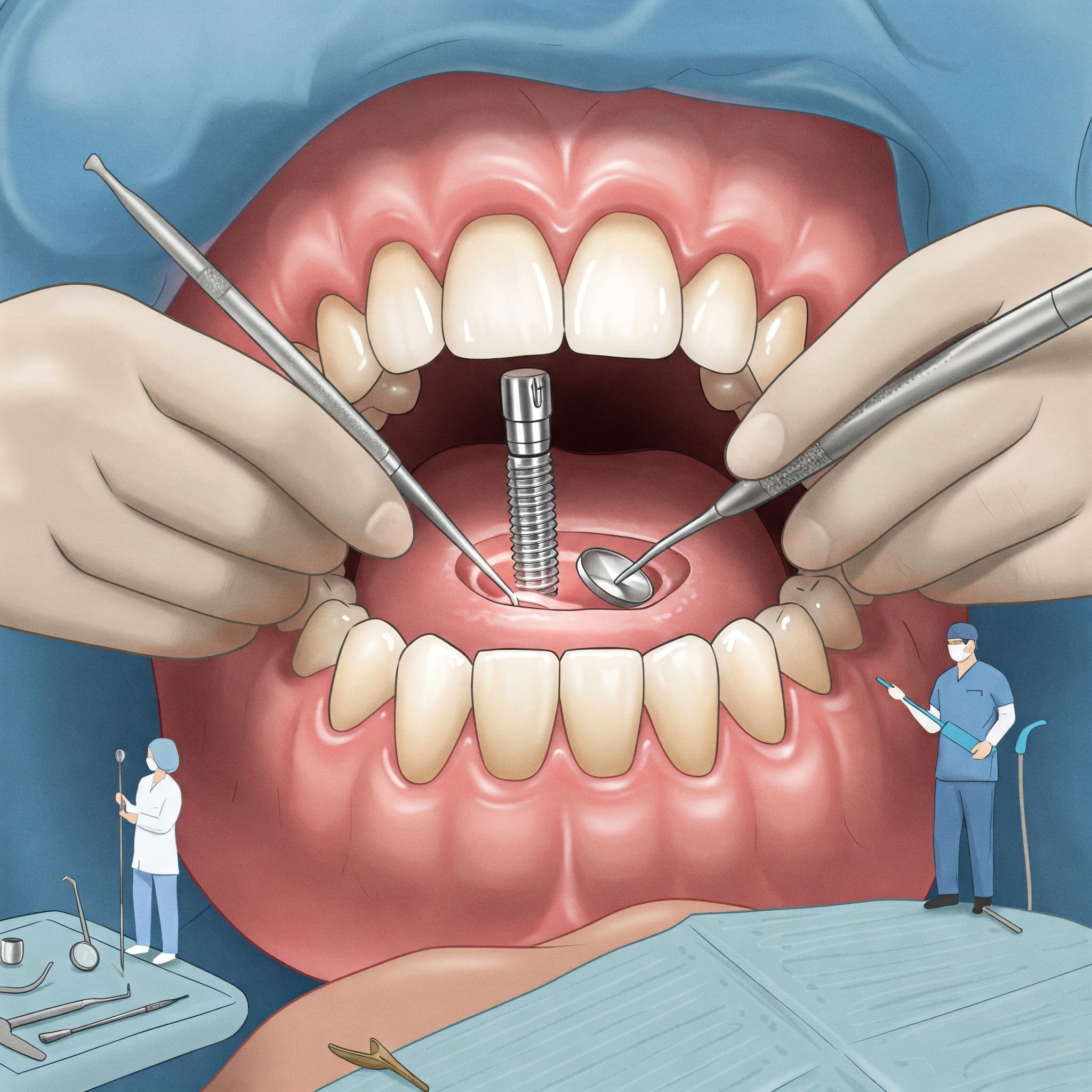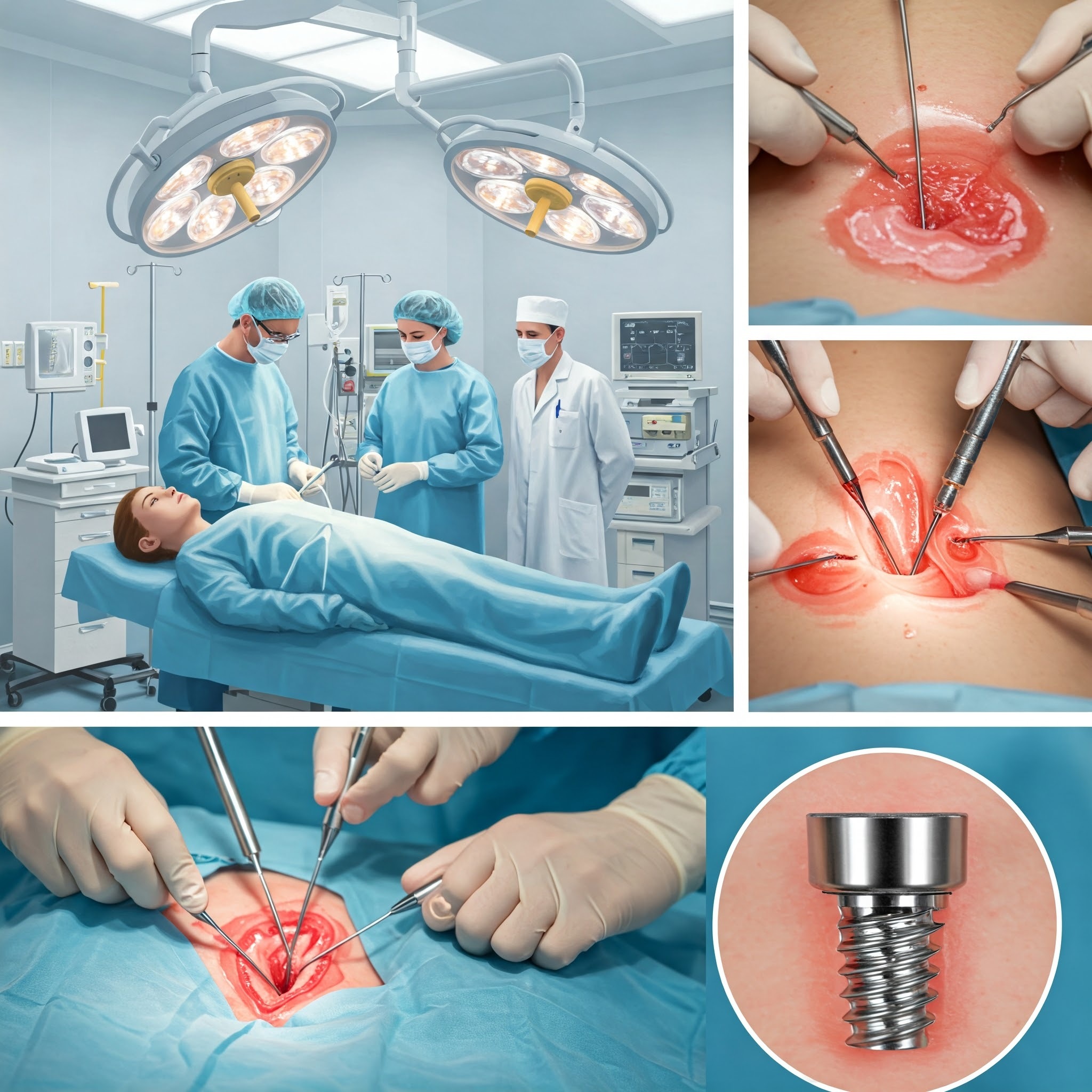Implants treatment
Neo-dental care: advanced implants treatment for permanent tooth replacement
Restoring smiles with precision and care
At Neo-Dental Care, we specialize in implants dental solutions designed to restore missing teeth with natural-looking, durable replacements. Our expert team offers dental implants surgery, providing long-term stability and function while enhancing your smile and confidence.
If you’re searching for an implants dentist near me, our clinic provides state-of-the-art implants teeth procedures that integrate seamlessly with your jawbone. Using a titanium post or screw, our specialists create replacement roots for missing teeth, ensuring a secure foundation for crowns, bridges, or dentures.
We offer various types of dental implants, including single-tooth implants, full-mouth restorations, and implant-supported dentures, tailored to your unique needs. Our experienced dental surgeon carefully evaluates each case to ensure optimal outcomes and long-lasting results.
While implants are highly effective, patients may have concerns about tooth implant side effects. At Neo-Dental Care, we prioritize safety and precision, using advanced techniques to minimize risks and promote a smooth recovery. Whether you need a single implant or a full-mouth restoration, our team is dedicated to providing the highest quality care for lasting oral health.


Implants treatment
Neo-Dental Care specializes in implants dental solutions, offering permanent and natural-looking replacements for missing teeth. Our dental implants surgery is performed using advanced techniques, ensuring a comfortable and precise procedure. The treatment involves placing a titanium post or screw into the jawbone, acting as replacement roots for missing teeth to provide a stable foundation for crowns or dentures. Whether you need single-tooth implants or types of dental implants for multiple teeth, our experienced dental surgeon ensures a seamless process. If you’re searching for an implants dentist near me, visit Neo-Dental Care for expert-led, long-lasting tooth restoration solutions.
- Dental implants vs. Other tooth replacement options: which is right for you?
When it comes to restoring missing teeth, patients often choose between implants dental, dental bridges, and dentures.
Dental implants offer a permanent solution that closely mimics natural teeth, while bridges rely on adjacent teeth for support, and dentures are removable appliances. Unlike dentures, which can cause discomfort or slipping, implants fuse with the jawbone, providing a stable foundation.
Bridges may require the alteration of healthy teeth, whereas implants preserve the integrity of surrounding teeth. While the initial cost of implants dental may be higher, they are a long-term investment in oral health, offering superior function, durability, and bone preservation. Consulting a specialist can help determine which option best suits individual needs and long-term dental goals.
Here are some of the check up and health screenings that you should get done:
- Pelvic Exam
- Pap Smear (Cervical Cancer Screening)
- Breast Exam
- Blood Pressure Measurement
- Cholesterol Screening
- Bone Density Scan (DXA)
- Blood Sugar Test (Glucose Screening)
- Thyroid Function Tests
- Blood Count (Complete Blood Count, CBC)
* The specific exams and screenings recommended can vary based on a woman’s age, family history, personal health history, and risk factors. It’s essential to discuss your individual healthcare needs and screening schedule with your healthcare provider.
- The step-by-step process of getting dental implants
The journey to a complete smile through dental implants surgery involves several stages. The process begins with a consultation, where the dentist evaluates bone density and oral health. Next, the implant placement phase involves surgically inserting a titanium post or screw into the jawbone, which serves as the artificial tooth root. Healing and osseointegration take a few months, allowing the implant to bond securely with the bone. Once healed, an abutment is attached to the implant, followed by a custom-made crown that matches natural teeth. Throughout the process, dental implants surgery ensures precision and functionality, restoring confidence and bite strength. Patients receive detailed care instructions at each stage to ensure a smooth recovery and successful implant integration.
- Benefits of dental implants: a lifetime solution for missing teeth
Dental implants provide a permanent and effective way to replace missing teeth. Unlike traditional dentures or bridges, implants restore full chewing ability and prevent jawbone deterioration.
The titanium post or screw used in implants integrates with the jawbone, acting as a stable foundation for the artificial tooth.
This process, known as osseointegration, preserves bone density and facial structure. Additionally, implants improve speech, eliminate discomfort associated with dentures, and enhance self-confidence. With proper care, they can last a lifetime, making them a cost-effective and durable solution. For those seeking to restore their smile permanently, dental implants offer unparalleled advantages in both function and aesthetics.
- Caring for dental implants: maintenance tips for long-term success
Proper care is essential for maintaining implants teeth and ensuring their longevity. Just like natural teeth, implants require daily brushing and flossing to prevent plaque buildup. Using a soft-bristle toothbrush and non-abrasive toothpaste helps protect the implant and surrounding gum tissue. Regular dental check-ups allow professionals to monitor the health of implants teeth and detect any potential issues early. Patients should avoid smoking and excessive alcohol consumption, as these can hinder healing and affect implant success. While implants are highly durable, neglecting oral hygiene can lead to gum disease and complications. With proper maintenance, dental implants can remain in excellent condition for decades, providing a confident and functional smile.
- Who is a candidate for dental implants? Understanding eligibility and requirements
Not everyone is an immediate candidate for dental implants, as certain factors influence eligibility. A strong, healthy jawbone is essential for supporting replacement roots for missing teeth, ensuring successful integration. Patients with insufficient bone density may require bone grafting before implant placement. Good oral hygiene and overall health also play a crucial role in implant success. Conditions like uncontrolled diabetes or heavy smoking can hinder healing and increase the risk of failure. Consulting a dental surgeon helps determine individual suitability and the best course of action. With proper assessment and planning, most individuals can benefit from implants, restoring their smile and oral function effectively.

Frequently asked questions
What are dental implants?
Dental implants are artificial tooth roots made of titanium that are surgically placed into the jawbone to support replacement teeth. They provide a strong and durable foundation for crowns, bridges, or dentures.
Who is a good candidate for dental implants?
Candidates for dental implants should have good oral health, sufficient jawbone density, and no severe medical conditions that could affect healing. A dental surgeon will assess eligibility during a consultation.
What is the process of getting dental implants?
The dental implant process involves multiple steps, including consultation, placement of the titanium post, healing period for bone integration, and attachment of the final prosthetic tooth. The full process can take several months.
Are there any side effects of dental implants?
Some common side effects include temporary swelling, discomfort, and minor bleeding after surgery. In rare cases, complications like infection or implant failure may occur, which can be managed with proper care.
How long do dental implants last?
With proper oral hygiene and regular dental check-ups, dental implants can last a lifetime. The crown or prosthetic tooth attached to the implant may require replacement after 10-15 years due to normal wear and tear.

Service line
Our locations
Neo-woman clinic
Apte Road
1212, Apte Rd, opp. Centro Hotel, Shirole Road, Shivajinagar, Pune, Maharashtra 411004
Contact us at: 9423039292
Our locations
Neo-woman clinic
Hadapsar
Gandharva Empire, 3rd floor, Above Fab India, Raskar Chowk, Amanora Park, Hadapsar, Pune, Maharashtra 411036
Contact us at: 7030114488
Copyright © 2026 neo-Woman – all rights reserved.
:::| powered by dimakh consultants |:::